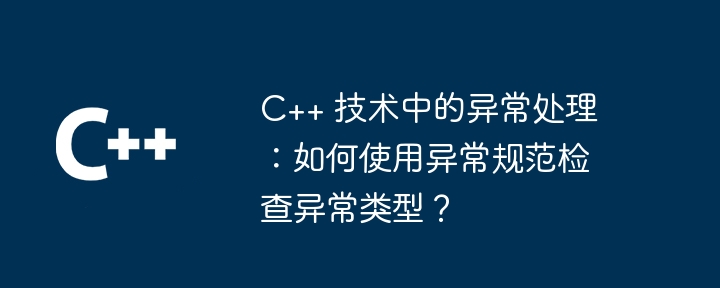
Exception specifications in C can specify the types of exceptions that may be thrown by functions to ensure correct handling of exceptions. To use exception specifications, use the noexcept keyword in a function declaration, followed by a list of exception types. For example, in the divide function, use noexcept(std::invalid_argument) to specify that only invalid_argument exceptions may be thrown, ensuring that other exception types will cause compiler errors.

Exception handling in C technology: Check exception type using exception specification
In C, exceptions are used to handle exceptions mechanism of the situation. Exception specifications allow you to specify the types of exceptions that can be thrown for a given function. This is useful when ensuring exceptions are handled correctly, as it allows the compiler to check for exceptions in the code.
How to use exception specifications
To use exception specifications, you use the noexcept keyword in a function declaration. noexcept The keyword is followed by a list of exception types, indicating the types of exceptions that can be thrown by this function. If no exception type is specified, it means that the function does not throw any exception.
The syntax is:
返回值类型 函数名 (参数列表) noexcept(异常列表)
{
// 函数体
}Practical case
Let us consider a function that calculates the division of two numbers:
int divide(int num1, int num2)
{
if (num2 == 0)
{
throw std::invalid_argument("除数不能为 0");
}
return num1 / num2;
}We An exception specification can be used to ensure that the function only throws invalid_argument exceptions:
int divide(int num1, int num2) noexcept(std::invalid_argument)
{
if (num2 == 0)
{
throw std::invalid_argument("除数不能为 0");
}
return num1 / num2;
}Now, if we try to use other types of exceptions, the compiler will issue an error. For example:
int main()
{
try
{
divide(10, 0); // 将引发 std::invalid_argument 异常
divide(10, 2); // 将引发 std::overflow_error 异常,但这是不允许的
}
catch (const std::exception& e)
{
std::cout << e.what() << std::endl;
}
return 0;
}The compiler will generate an error for the second line of code because it violates the function's exception specification.
The above is the detailed content of Exception handling in C++ technology: How to check exception types using exception specifications?. For more information, please follow other related articles on the PHP Chinese website!
 What are the differences between c++ and c language
What are the differences between c++ and c language
 Recommended learning order for c++ and python
Recommended learning order for c++ and python
 Cost-effectiveness analysis of learning python and c++
Cost-effectiveness analysis of learning python and c++
 Is c language the same as c++?
Is c language the same as c++?
 Which is better to learn first, c language or c++?
Which is better to learn first, c language or c++?
 The difference and connection between c language and c++
The difference and connection between c language and c++
 C++ software Chinese change tutorial
C++ software Chinese change tutorial
 Cost-effectiveness analysis of learning python, java and c++
Cost-effectiveness analysis of learning python, java and c++




